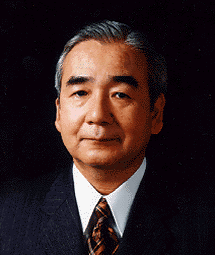
 |
Rei SHIRATORI ■ President, Institute for Political Studies in Japan (IPSJ) ■ Honorary Consul General, Republic of Malta ■ Professor Emeritus, Dokkyo University, and Tokai University ■ Select Professor of Political Science, Akita International University |
■BIO DATA= Education: Awards and Honors: Degree: Teaching and Research
Experience: Visiting Fellows and
Visiting Professors: |
| ■PUBLICATIONS= Please see Scholarly Achievement for Shiratori's publications. |
| ■RESEARCH TOPICS= The Major area is 'Modern Political Analysis.' He covers wide area in political science such as political parties, election studies, voting behavior, and political finance. He also published books on welfare states' policy, peace research and theory of political development. He has been also engaged in the assistance of democratization processes in various countries such as Nepal, Indonesia, Bosnia and Herzegovina, Kosovo, Afghanistan and Kyrgyz. |
| ■PROFILE= Professor Rei Shiratori, President of IPSJ, is specialized in the theory of modern political analysis, and is famous for his sharpness in theoretical approach to the contemporary politics and for his various activities including wide and close contact with real politics in Japan. His activities extend into three fields; he teaches "Theory and Practice of politics" in Tokai University where he serves as a professor of political science and director of the Research Institute of Social Sciences, holds president's chair in the Institute for Political Studies in Japan, and recently he puts much emphasis on international academic and humanistic activities as you can see his director's chair of the Center for the Study of Contemporary Japan in University of Essex (1984-1987). As he studied at Oxford, he is versed in classical theories of politics, which can be seen in his first book "The Formation of Political Theory" (1965). Then, he turned his face to contemporary political theories retaining his problem-consciousness which he acquired during his study of classical theory, and published "Theory of Political Development" (1968) and "Quantitative Analysis of Politics" (1971), both of which are well-balanced achievements of first class quality. In these days, he is concentrating more upon the analysis of contemporary Japanese political situations and the examination of the theory of welfare state. The results of these efforts are seen in "Public Opinion, Election and Politics" (1972), "Conservative Rule in Post-War Japan" (1977), "Japan in the 1980's (in English, Kodansha International 1982), "Welfare State East and West" (in English, Oxford University Press 1986), and "Comparative Political Finance Among the Democracies" (in English, Westview Press 1994). He is now regarded as one of the most reliable scholars in the analysis of political parties, elections, and consciousness of Japanese voters. From 1994 to 97, he was also president of "Japan Association of Local Government and Urban Management Studies." From 1999 to 2003 he was President of Japan Association of Simulation and Gaming (JASAG), then in 2003 he became President of International Simulation and Gaming Association (ISAGA). He was engaged in the democratization processes of former despotic countries as a member of International Advisory Board of IFES. He committed himself to the democratization elections in Nepal (1990), Indonesia (1999), Kosovo (2000), Afghanistan (2004), Kyrgyz (2005) and Constitutional Assembly Election in Nepal (2008). He lectured the theory of democracy and democratization in Philippines, Bosnia, Afghanistan and in Nepal. He assisted the development of social sciences in Romania after the democratization in 1989, and was given Honorary PhD by the University of Constantza. In 2003 he was appointed to be Honorary Consul General for the Republic of Malta. |
| ■Office= Institute for Political Studies in Japan 1-16-16-207 Ohara, Setagaya-ku, Tokyo 156-0041, JAPAN TEL: +81 3 3460 2392 FAX: +81 3 3465 4942 |
![]()